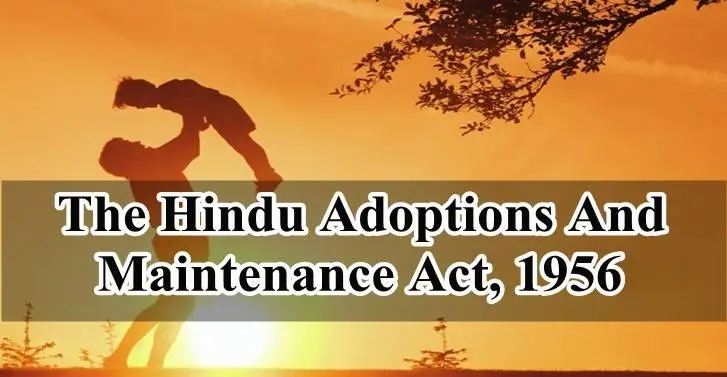
RIGHT TO MAINTENANCE (Hindu Maintanance & Adoption Act)
Introduction
Hindu Adoption and Maintenance Act deals with the legal procedure of adoption of children by Hindu and other legal obligations that follow, including maintenance of children, wife, and in-laws. In the first part of this article, I will talk about adoption for Hindus and the second part shall deal with maintenance.
Applicability of Hindu Adoption and Maintenance Act
As per the act – a Hindu does not merely mean a person that follows Hinduism but also includes other sub-religions of Hinduism, such as- Buddhists, Jains, Sikhs, Virashaiva, Lingayat, or members Arya Samaj. Followers of Brahmo and Prarthana are also included in the definition of Hindu.
As a matter of fact, the Hindu Adoption and Maintenance Act covers everyone residing in India who is not a Christian, Muslim, Parsi or Jew.
The Act sheds light upon:
What a valid adoption is?
Who can adopt children?
Procedure to adopt children along with other duties and obligations that occur after adoption.
What is Adoption?
The Act has no description of the word “Adoption” per se, but it is a Hindu law derived from uncodified Hindu laws of Dharamsastra, specifically Manusmriti.
Adoption has been described in Manusmriti as ‘taking someone else’s son and raising him as one’s own’.
Hindu Adoption and Maintenance Act has made the definition of ‘adoption’ much wider by using the word ‘child’ instead of ‘son’. Child includes both a girl and a boy child, and not merely a son.
With the change in society over time a codified and uniform legislation was required to serve the democracy, so, no adoption can be made without the procedure mentioned in this act. If any adoption is made neglecting this act, the adoption shall be rendered to be void.
Adoption will be valid only if it has been made in compliance with this Act.
Who can Adopt a child?
In order to adopt a child, the person must be a Hindu and have the capacity to adopt it. A Hindu male who wishes to adopt a child must meet the requirements provided in Section 7 of the act and a Hindu female wanting to adopt shall abide by Section 8 of the same.
The capacity of a Hindu male to adopt.
Section 7 states that a male Hindu who is willing to adopt a child must fulfil the following conditions:
Attained the age of majority; and
Be of sound mind.
- Must have a wife that is alive whose consent is absolutely necessary.
- It can be overlooked if the wife is incapable of giving consent due to insanity or other reasons.
- If a person has multiple wives, the consent of all the wives is necessary for adoption.
In Bhola & ors v. Ramlal & ors, the plaintiff had two wives and the validity of adoption was in question as he had not taken the consent of one of his wives before adopting.
It was the contention of the plaintiff that his wife had absconded and could be considered as good as dead.
The High Court of Madras observed that the wife of the plaintiff had run away but could not be considered dead unless she had not been heard from for at least seven years. It was held that as long as the wives are alive, the consent of each wife is necessary for a valid adoption.
If the wife has converted to some other religion or renounced the world, her consent isn’t necessary for adoption. But, the existence of a living wife is an essential requirement for a Hindu male to adopt children.

